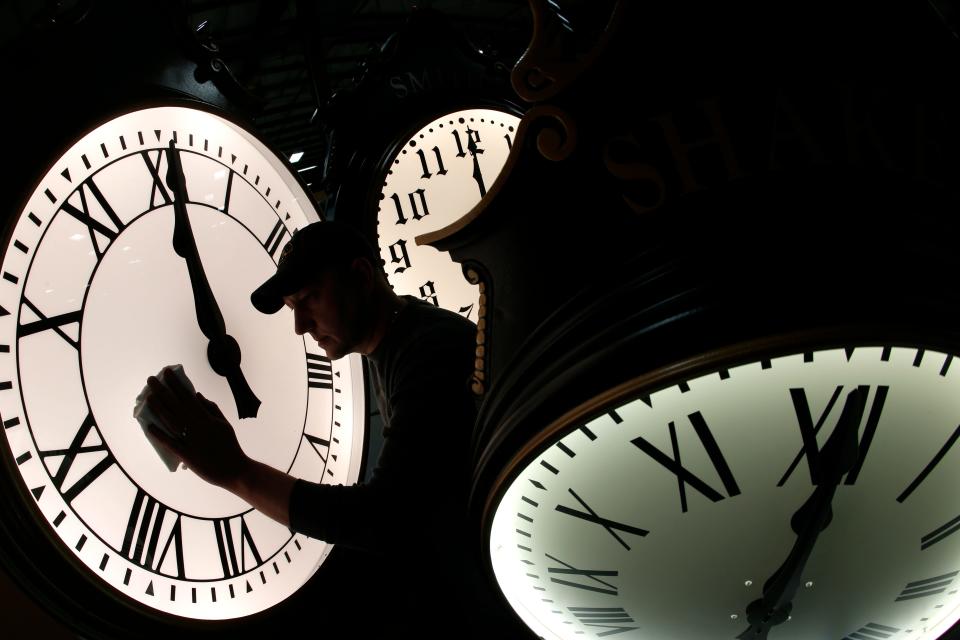When does daylight saving time start in 2024? And will RI support making it permanent?
- Oops!Something went wrong.Please try again later.
Get ready to spring forward – daylight saving time is coming up soon.
On Sunday, March 10, at 2 a.m., daylight saving time begins, and Americans will lose an hour of sleep as the clocks are set ahead one hour. The perk is later sunsets, but the annual disruption has become increasingly unpopular – so unpopular that there's been a push in Congress to do away with the practice altogether.
Rhode Island Sen. Sheldon Whitehouse is among those trying to eliminate the hassle of changing the clocks through the Sunshine Protection Act.
What is the status of the Sunshine Protection Act?

The legislation, of which Whitehouse is a sponsor, would stop the changing of the clocks by making daylight saving time permanent. The U.S. Senate unanimously approved the Sunshine Protection Act in 2022, but it did not pass in the U.S. House of Representatives and was not signed into law by President Joe Biden.
A 2023 bill idled in Congress, but Whitehouse's office said he still supports the concept.
“Many people spend all winter looking forward to that March weekend when we ‘spring forward.’ But Rhode Islanders shouldn’t have to wait to enjoy more afternoon daylight in the coldest months," Whitehouse said in a prepared statement. "I’m working to build consensus in Congress to free us all from adjusting our clocks twice a year, and I believe making Daylight Saving Time permanent is the best route forward.”
Has RI passed legislation to keep daylight saving time year-round?

Some states have taken matters into their own hands, passing bills or resolutions to show their support for ending the fiddling with the clocks. But so far Rhode Island hasn't.
As of 2024, 19 states have passed legislation or resolutions to provide for year-round daylight saving time if Congress were to authorize such a change. They are Colorado, Kentucky, Alabama, Georgia, Minnesota, Mississippi, Montana, Idaho, Louisiana, Ohio, South Carolina, Utah, Wyoming, Delaware, Maine, Oregon, Tennessee, Washington, and Florida.
Which states don't observe daylight saving time?
In the U.S., Arizona (except for the Navajo Nation), Hawaii, Puerto Rico, the U.S. Virgin Islands, the Northern Mariana Islands, Guam and American Samoa do not observe daylight saving time.
Both Arizona and Hawaii previously opted out of daylight saving under an exemption statute in the 1960s.
What is daylight saving time?
According to the Old Farmer's Almanac, daylight saving – saving being singular – time "is the practice of moving the clocks forward one hour from standard time during the summer months and changing them back again in the fall." The purpose of changing the clocks is to take advantage of natural daylight.
Benjamin Franklin, in his 1784 essay "An Economical Project," introduced the idea of a change in sleep schedules, but the concept of daylight saving time wasn't seriously proposed until more than a century later. Englishman William Willett prompted the first major push for it in the early 1900s.
The current daylight saving period in the U.S. was established with the Energy Policy Act of 2005, which went into effect in 2007. Before that, many pieces of legislation dealt with daylight saving time, particularly during World War I and II, including repeals and reinstatements. Germany was the first country to enact it as a means of saving electricity during World War II.
This article originally appeared on The Providence Journal: When is daylight saving time 2024? Here's when to 'spring forward'

